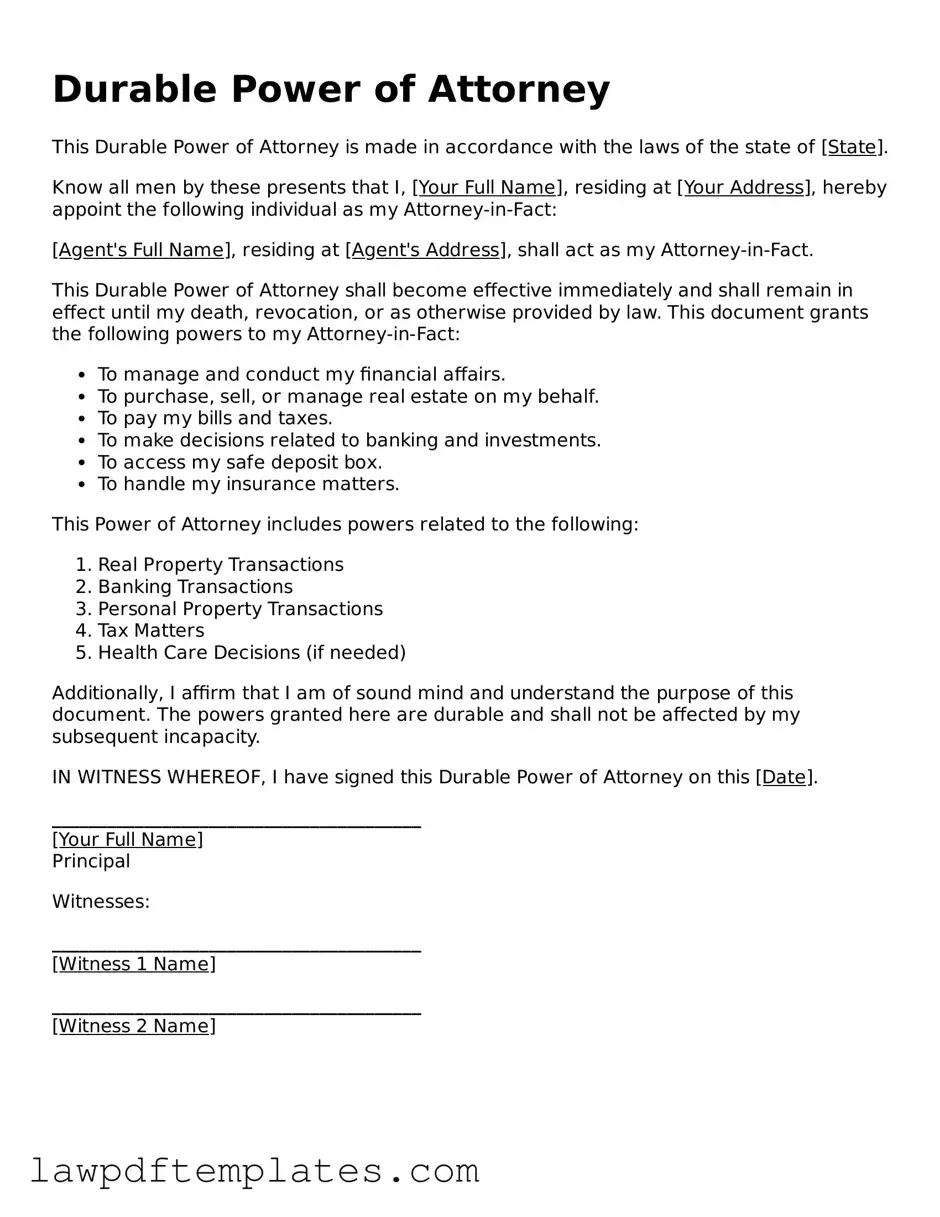Attorney-Approved Durable Power of Attorney Document
State-specific Durable Power of Attorney Forms
Form Breakdown
| Fact Name | Description |
|---|---|
| Definition | A Durable Power of Attorney (DPOA) is a legal document that allows a person to appoint someone else to make decisions on their behalf, even if they become incapacitated. |
| Durability | The term "durable" means that the authority granted remains in effect even if the principal is no longer able to make decisions due to illness or disability. |
| State-Specific Forms | Each state has its own specific form for a Durable Power of Attorney, and it is important to use the correct form that complies with state laws. |
| Governing Law | In the United States, the Uniform Power of Attorney Act provides a framework, but individual states have their own laws that govern DPOAs. |
| Types of Authority | The document can grant broad or limited powers, allowing the agent to handle financial, legal, or healthcare decisions based on the principal's wishes. |
| Revocation | A Durable Power of Attorney can be revoked at any time by the principal, as long as they are mentally competent to do so. |
| Agent's Responsibilities | The agent has a fiduciary duty to act in the best interests of the principal, making decisions that align with the principal's values and preferences. |
| Execution Requirements | Most states require the DPOA to be signed by the principal and witnessed or notarized to be legally valid. |
| Healthcare Decisions | A Durable Power of Attorney can be specifically designated for healthcare decisions, often referred to as a Healthcare Power of Attorney, which is separate from financial powers. |
Sample - Durable Power of Attorney Form
Durable Power of Attorney
This Durable Power of Attorney is made in accordance with the laws of the state of [State].
Know all men by these presents that I, [Your Full Name], residing at [Your Address], hereby appoint the following individual as my Attorney-in-Fact:
[Agent's Full Name], residing at [Agent's Address], shall act as my Attorney-in-Fact.
This Durable Power of Attorney shall become effective immediately and shall remain in effect until my death, revocation, or as otherwise provided by law. This document grants the following powers to my Attorney-in-Fact:
- To manage and conduct my financial affairs.
- To purchase, sell, or manage real estate on my behalf.
- To pay my bills and taxes.
- To make decisions related to banking and investments.
- To access my safe deposit box.
- To handle my insurance matters.
This Power of Attorney includes powers related to the following:
- Real Property Transactions
- Banking Transactions
- Personal Property Transactions
- Tax Matters
- Health Care Decisions (if needed)
Additionally, I affirm that I am of sound mind and understand the purpose of this document. The powers granted here are durable and shall not be affected by my subsequent incapacity.
IN WITNESS WHEREOF, I have signed this Durable Power of Attorney on this [Date].
________________________________________
[Your Full Name]
Principal
Witnesses:
________________________________________
[Witness 1 Name]
________________________________________
[Witness 2 Name]
Common mistakes
Filling out a Durable Power of Attorney (DPOA) form is a critical task that requires careful attention. Many individuals make common mistakes that can lead to confusion or invalidation of the document. Understanding these pitfalls can help ensure that the DPOA serves its intended purpose.
One frequent error is failing to specify the powers granted to the agent. A DPOA should clearly outline what decisions the agent can make on behalf of the principal. Without this clarity, the agent may not have the authority to act when needed. It is essential to be explicit about financial, medical, and legal decisions.
Another mistake is neglecting to date the document. A DPOA must be dated to establish when it becomes effective. If the date is missing, questions may arise about the timing of the agent’s authority. This could lead to complications in situations where timely decisions are critical.
Some individuals overlook the need for witnesses or notarization. Depending on state laws, a DPOA may require one or more witnesses or a notary public to be valid. Failing to meet these requirements can result in the document being considered invalid, rendering the agent unable to act.
Additionally, people often forget to communicate their intentions to their chosen agent. It is vital that the agent understands their role and the specific powers granted to them. Without this communication, the agent may be unprepared or unwilling to fulfill their responsibilities.
Another common oversight is not reviewing the form for accuracy. Simple mistakes, such as misspellings or incorrect information about the principal or agent, can cause significant issues. Taking the time to carefully review the document can prevent these errors.
Some individuals fail to update their DPOA when circumstances change. Life events such as marriage, divorce, or the death of a previously appointed agent necessitate a review and potential revision of the document. Keeping the DPOA current is essential to ensure it reflects the principal's current wishes.
Finally, many people do not consider the implications of granting broad powers. While it may seem convenient to give an agent wide-ranging authority, it can also lead to misuse. It is crucial to balance flexibility with control, ensuring that the agent's powers are appropriate for the principal's needs.
Consider Popular Types of Durable Power of Attorney Documents
Real Estate Power of Attorney Template - Clear documentation can prevent misunderstandings about the extent of the agent's power.
When engaging in a transaction involving personal property, it is advisable to utilize the Illinois Bill of Sale, which ensures that both parties have a clear understanding of the agreement. For those looking to create or obtain a comprehensive form, resources such as Fast PDF Templates can provide helpful templates to streamline the process.
Poa Dmv - A good choice for elderly individuals who may need assistance.
